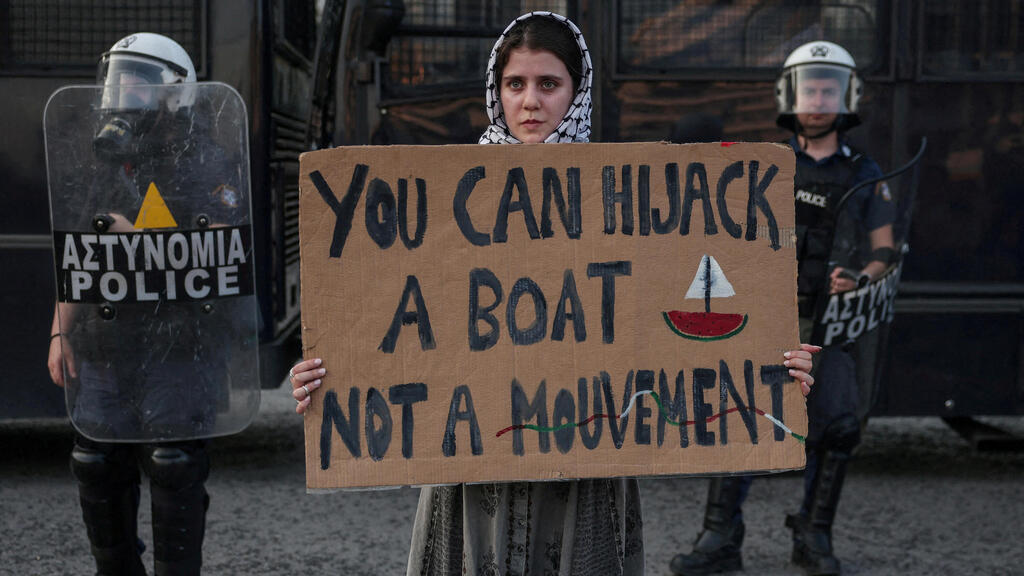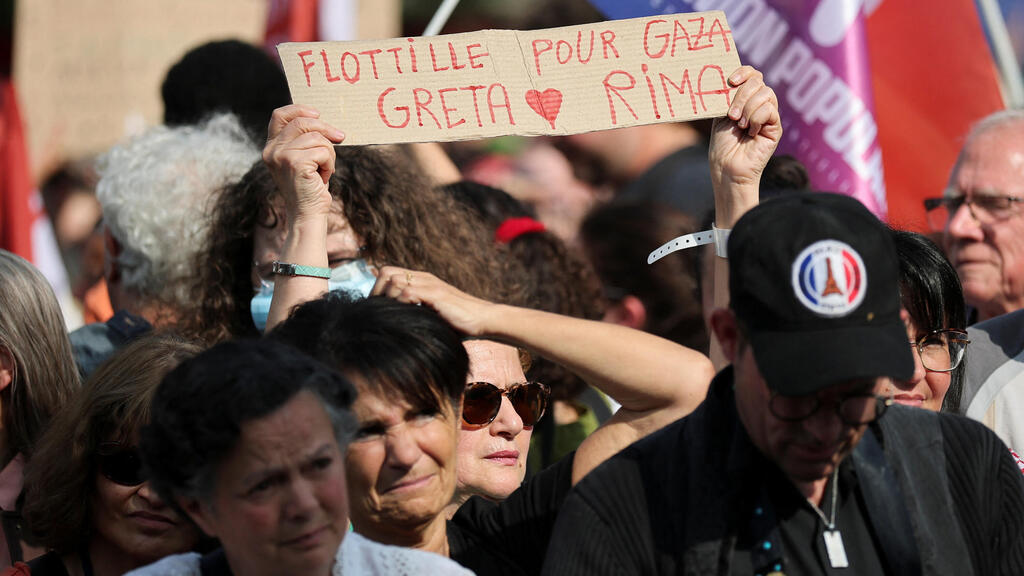"We've been kidnapped, we call on our governments to help rescue us"; "an act of piracy by Israel"; "they sailed to Gaza in Palestine, not Israel"; "their arrest is illegal"—these are just some of the headlines appearing in hundreds of thousands of social media posts and even in some newspapers and news sites worldwide, following the saga involving Greta Thunberg and her flotilla delegation, who were detained by Israeli forces before reaching the shores of Gaza.
5 View gallery


Greta Thunberg speaks to reporters at Charles DeGaulle airprt in Paris
(Photo: Hugo Mathy / AFP)
Even though the IDF acted in accordance with international law when it detained the 12 activists; although even the International Criminal Court in The Hague does not dispute the legality of Israel’s longstanding naval blockade on Gaza; and despite the clear right of a sovereign state to intercept individuals attempting to unlawfully enter an active war zone under its jurisdiction—propaganda, misinformation and outright lies continue to gain traction among millions around the world, regardless of how many memes mocking the incident go viral.
Israel’s official response pulled out all the stops. A photo of Greta smiling as a soldier handed her a sandwich and a bottle of water achieved its intended effect. Other images and videos showing IDF soldiers distributing food and water to the activists also spread widely on social media, drawing thousands of shares and comments.
5 View gallery


Greta Thunberg accepts a sandwich and a bottle of water from an Israeli soldier
(Photo: Foreign Ministry)
For a moment, it seemed that might be enough. Whether due to widespread fatigue in Europe with the young climate activist, or the transparent PR nature of the voyage and its preordained outcome, or the IDF’s effective neutralization of the incident—it briefly appeared that Israel had the upper hand.
The refusal to be deported was expected
But then came the deportation process, and once again the narrative flipped. While Greta is already back in Europe after signing her deportation papers—along with four other members of the delegation—eight others, including outspoken anti-Israel French member of the European Parliament Rima Hassan, who was previously deported from Israel, refused to sign.
Social media is not just another platform—it is today’s primary battlefield
Those who declined deportation, including Hassan, were placed in custody for 96 hours at the Givon detention facility for illegal entrants. After that period, they can be deported with or without their consent. Yet these four days of detention are more than just a bureaucratic matter—they are being used as a political stage.
Over the course of these 96 hours, under the gaze of cameras and with the backing of anti-Israel propaganda networks, Hassan is transforming herself into a martyr, a victim of the "occupation" and a "colonial system of oppression." She knows exactly what she’s doing. Every hour at Givon is another opportunity to generate headlines, attract sympathy and spin a narrative that Israel has long struggled to counter.
Refusing to sign the deportation order isn’t a principled stand—it’s a calculated tactic designed to provoke another confrontation, to generate that “winning” image of forced deportation or allegedly inhumane treatment. For her, every additional day in custody is valuable currency on social media.
One example: Hassan posted on her X account, “We need your help in widely sharing this post by tagging the heads of state of team members, demanding their immediate release. Call on the relevant authorities to demand the immediate release of the entire team from Israel.” This, from a European lawmaker who fully understands she is not being forcibly held—and who has personally refused to leave.
Time for a more assertive Israeli media strategy
This is precisely where Israel’s public diplomacy efforts must ramp up. Not just by issuing delayed responses or publishing good images after the narrative has already been shaped—but by leading the conversation. Because this incident is far from over. Without a timely, strategic, visually driven response—especially one that leverages Instagram, TikTok, and X—Israel is poised to lose the battle for public opinion once again, despite having all the tools to win it this time.
Get the Ynetnews app on your smartphone: Google Play: https://bit.ly/4eJ37pE | Apple App Store: https://bit.ly/3ZL7iNv
It's essential to recognize: social media is not just another platform—it is today’s primary battlefield. What happens online right now carries more weight than any court ruling in The Hague or press briefing in Jerusalem. Virality trumps facts, and a single manipulative hashtag can erase days of carefully crafted messaging. It’s time to understand the new rules—and play by them.
Let’s say it plainly: part of the problem is that official Israel still acts as if it’s playing chess, while its adversaries are fighting in an MMA ring. No rules, no red lines and one clear goal—to take Israel down in the court of global public opinion.
5 View gallery


A demonstrator at a protest that broke out in Athens after the Gaza flotilla was stopped
(Photo: Reuters)
This gap between a measured response and a chaotic reality continues to hurt Israel. When Hassan posts a photo from the detention center, it will reach millions instantly. When Israel publishes a clarification or a photo from the same facility, it might—at best—reach the IDF spokesperson’s Twitter feed. That’s not enough. It doesn’t work.
The solution: a content army and an aggressive media front
If Israel wants to change the game, it must create a dedicated digital diplomacy unit that operates in real time, around the clock—not just with multilingual spokespeople, but with a full “army” of content creators, video editors, and social media experts who understand each platform and know how to reach audiences in Europe and the U.S. in ways that actually resonate.
5 View gallery


Protest in Paris against the arrest of members of the Gaza flotilla delegation
(Photo: Reuters)
Short videos, focused infographics, eyewitness accounts—everything needed to fight for public opinion where it’s actually being shaped. Yes, it’s that urgent and that important. Because public perception ultimately drives policy—and influences it. In an era where the battle for legitimacy is just as crucial as the one on the ground, public diplomacy must operate like a full-scale military campaign.
Right now, it appears Israel is simply asleep at the wheel.


